I forget where I read this factoid, but if you make any absurdly unreasonable request of a stranger, like cutting in line at the supermarket, your odds of a successful request increase from 1% to 90%, if you provide a ‘because’ justification. E.g., Saying, ‘Can I skip ahead of you’ on its own is less persuasive than saying: ‘Can I skip ahead of you please? I’m in a rush because my house is on fire, it’s really triggering my IBS, and I need to purchase this Imodium ultra plus so I can make it back downtown to meet the fire brigade’.
It may have been from Robert Cialdini’s seminal text Influence, or his student Scott Adams’ book How to Fail at Everything & Still Win Big, or Levitt & Dubner’s Freakonomics. All good books, worthy of your time, if you have any. These are the foundational texts for anyone interested in either marketing or psychopathic ‘nudge-unit’ programs. (As an aside, I’m fairly certain that mentalist Derren Brown had a consulting hand in the ‘persuasive’ techniques used by our government in the past few years. If he didn’t, practitioners with similar levels of skill certainly did).
What the authors of each of these modern books understood when applying scientific theory to marketing and politics, is that human beings exist within a story. That is the same thing that Alfred the Great understood, when he nurtured the art of literature in these lands, and brought an entire culture into being, by linking our stories as individuals to a wider universal history.
I pondered this thought on my long drive home, the day after Ash Wednesday. The Carnival of the old year was over. Time for repentance, before entering the new one.
At our last correspondence, I had terminated my contract on my last ship and was about to spend a few days training my replacement. The guy who showed up also turned out to be a shipowner – a small tour boat business in Croatia that was battered by covid restrictions – and an incredibly highly trained and experienced Class 1 Master Mariner. One of a handful of Europeans to rise to Master in the exclusive Japanese container company, NYK. We had a great time driving the boat all week. He concluded that she was indeed, a ‘special lady’. So, it wasn’t just me dramatizing it. J
I managed to get off the boat on Sunday 19th, and I went for a brisk morning walk. I happened upon a service at Sint Jacobskirk in Vlissingen, a grandly restored protestant church in the centre of town. Of course, I couldn’t understand a word that was being said. Luckily, however, that meant I didn’t have to sing.
Instead, I just looked up the relevant bible passages on my app, and contemplated their meaning, in a beautiful nautical-themed church, with its Roman Catholic and orthodox influences juxtaposed pleasantly with model yachts, and a huge stained glass window memorialising Michael the Raider – the Grandfather of the Dutch Royal Navy. Merchant Captain turned Admiral, Michiel De Ruyter was the scourge of the English, Spanish and French during an age of privateers and maritime empires. He was baptised and married in Sint Jacobskirk, a crossroads of Protestant theology, Anglicanism and Catholicism throughout history. He was a great and terrible warrior, held in high esteem by the Dutch.
The fact that there is an Anglican corner of the church, as well as an English name for the city (Flushing) which was ruled by England for many years, stands testament to the close and complicated ties between our two countries. Made even more poignant to me by the memorials on Uncle Beach, listing the names of Scottish regimental casualties during the WW2 liberation of this part of Westerschelde.
The first verse for contemplation was Moses killing the Egyptian. He sees a fellow Hebrew being whipped and beaten by an Egyptian overseer. He feels indignance for this member of the tribe he grew up not knowing. Perhaps guilt-ridden by the distance from his clan, one he was a secret and privileged diasporic part of. As an outsider looking in, his blood boils and he rises to murder the Egyptian and hide his body in the sand.
Interestingly, he looks around first to see that there are no witnesses before proceeding to murder the man.
The text shows how Moses is astounded to find that both his tribe and his Pharoah know about what he did. The Bible never explains how Pharoah, or the Jews, found out about the killing. This leaves an ambiguous feeling in the text that makes one simple point. If you do the wrong thing, it doesn’t matter that there were no witnesses. You still did it.
One gets the feeling that Moses the Murderer was a little bit dim in his younger years. Certainly, his lack of impulse control is something many of us boys struggle with when our bodies reach manhood before our brains. Perhaps he realised in hindsight that people might notice the Hebrew he saved coming back from the desert, while the Egyptian guardsman did not.
In the second reading of the service, this incident was contrasted with the words of Jesus:
‘love your enemies and pray for those who persecute you…He causes his sun to rise on the evil and the good, & sends rain on the righteous and the unrighteous…Be perfect, therefore, as your heavenly father is perfect’.
Simple advice, eh? Turn the other cheek. Hand over your shirt and coat. Walk two miles. Be perfect.
I started coughing and had to leave before I could deduce what clever conclusions the minister was delivering with his incomprehensible Dutch cadences. Yet, the walk back to the ship, past the names of my fallen countrymen, a Holocaust memorial, and old Dutch & English fortifications seemed all the more haunting after this thought-provoking contrast.
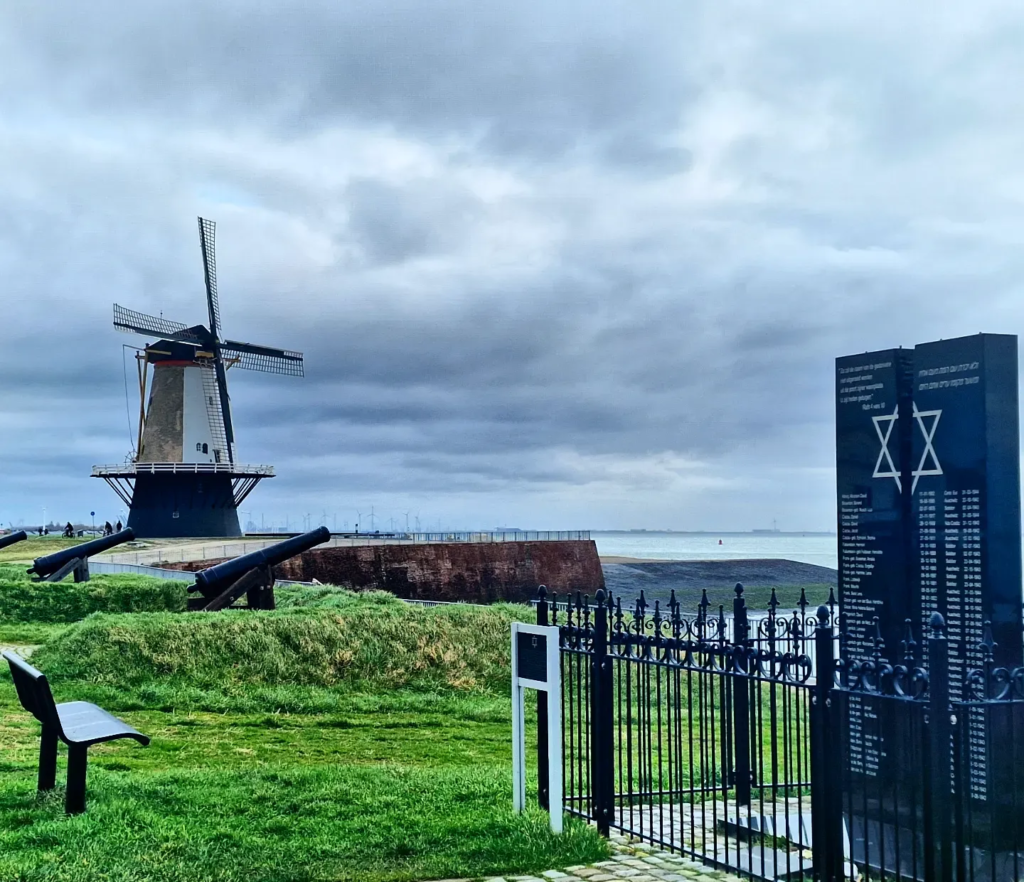
I have always been a bit combative. I grew up admiring strength and having a certain pride in my country’s military achievements. I enjoyed the Army Cadets and shooting as a teenager but wasn’t so fond of the exercise component. A career in the Royal Navy seemed to beckon for a while, until, well, 4 years in the University Reservists proved to be sufficient. It wasn’t until the Merchant Navy that my love of a good punch-up really came to the fore.
With no pretence of aristocratic superiority, the Merchant Navy officer is afforded a greater degree of freedom to pursue sin than his military counterpart. At nautical college I excelled in the arts of navigation, boat handling, advanced swearing techniques, drinking, and the use of improvised weaponry in bar fights. After missing class one day (100% attendance was mandatory), I had to tell my tutor that I was late because I’d just been released from a night a jail.
Our class tutor was a salty old South African female captain. She kept a deadpan expression, lifted one eyebrow, and said ‘you’re not a real sailor until you’ve been in jail abroad, Campbell. Sit down’.
I loved it.
Being part of a serious and noble profession, that pays reasonably well, and yet at the same time allows room for you to occasionally behave like a depraved maniac, was liberating to a degree that is hard to express. Not something your average university graduate will ever get to experience in today’s emasculated world of cancel culture and sensitivity training.
Over the years I’ve worked most of the stupidity and aggression out of my system. Random punch-ups in bars around the world, mostly started by others and mostly finished by me and/or my buddies. Occasional defeats with wounds to lick were laughed off as part of the sport of the Great British Night that is a Pint & a Fight. Victories against those who deserved it regaled with pride over the messroom table the next morning.
I do feel shame now, but even as I write this, I’m aware of my boastful nature, and stupid pride.
One incident I recall well was in a bar in the Netherlands (I’ve sampled most of them over the years). I saw a dirty old man and some shady older guys on a night out, with a gross-looking older woman, and – contrastingly – a very physically beautiful young blonde girl in their company. The girl looked young enough to be their daughter.
I noted strange behaviour as the night went on, and after a while, I was convinced that the girl was being rented out. When I saw the old man intervene with any young man who tried to dance with the blonde girl, I asked a Dutch-speaking engineer in our group if he was seeing what I was seeing. When he confirmed that the old pervert was asking for money from anyone who danced with the girl, I instantly saw red.
Unlike Moses, I didn’t kill him, and more stupidly than Moses, I didn’t even care to check to see if anyone was looking.
I rushed up to the man and slammed his body across the room, up against a wall, and started beating him. I punched his face and torso until my knuckles bled. The girl and her prospective customer ran away, and as the man lay sparkled on the deck, I went back to finish my pint.
I know I got him good because I remember my knuckles being messed up for a good couple of months. If I was feeling it, so was he.
As I emptied the dregs of my glass, a firm hand lay itself upon my shoulder. I turned assuming the worst, but it turned out to be the bar security staff, who evidently seemed quite concerned about my welfare. They apparently knew what was going on in their bar, and I don’t think it was quite legal, even in Holland. They led me out back and advised that I disappear quickly while I still could.
That ship I was on was crewed mostly by young Jocks & Geordies in their twenties, and they’d all seen what happened. None of us like pimps or paedophiles, so there were many high-fives and bouts of congratulation. After three days passed without any police attendance at the vessel, total victory was declared.
I was proud of that one. I still kind of am, even though now I know how stupid, and pointless and dangerous it was to get involved in that situation. But at the time, I didn’t even hesitate. It wasn’t just the evening’s lubrication. It was a lifetime’s memory of being weak, and downtrodden, and lied to.
Was Moses so wrong to kill that cruel Egyptian guardsman? If it were my daughter being exploited by some shady drug addict pimp, I’d want someone to kill him.
I don’t regret punishing that person. Not in my heart. What I do regret is being intoxicated when I did it. And I do regret and fear my pride in such acts.
Justice is supposed to belong to God. Not random idiots like me on a night out with the lads. If only our illustrious law enforcement officers would take care of these kind of people for us, eh? Alas, they’re probably all too busy bowing down in front of the priests at Black Lives Matter begging absolution, or dancing at a Trannies for Toddlers show these days.
That’s the trouble these days. All hierarchy of morality and authority has been inverted. Most likely an intentional pre-requisite for totalitarian rule, based on fiat inflation and taxation.
I’m older, and wiser now. After my first year as Captain, I’m realising that my little fiefdom demands more of me. It isn’t like being a manager on land. You don’t get to go home at night away from the office and be yourself behind closed doors. When you spend a full month living cheek-by-jowl with your subordinates, customers and clients, there is nowhere to hide. And living with a false face is impossible to sustain for more than 2 weeks when there is no downtime or escape.
Therefore I have to be sorry, and change my character, from the bottom up, so that I can be true all the time.
Kings and Queens can live by the old monarchical leadership style, ‘Never Complain, and Never Explain’, so long as they act the part in public. Military Naval officers can get away with that too. But as every merchant ship master knows, and the royal family are now discovering in the age of alternative media, your leadership style had better have more consistency, integrity, and depth than that, in a world with no privacy.
Those two little bible passages dug up a lot of old memories for me.
What Jesus commands is consistency. Justice cannot be arbitrary. Therefore, arbitrary deeds cannot be just, by definition. Solving a problem in the moment, is not the same as solving the ‘class’ of problem itself.
These memories haunt me now, as I discover repentance.
Mortality has been on my mind these past 3 weeks, as I join my new ship. The old chief engineer dropped dead a couple of weeks ago, just as he was leaving his house to travel to the vessel. Another friend of mine reported that a superintendent came on board his ship recently, and ‘never woke up’. My mate came out of his cabin in the morning to find paramedics and police removing the superintendent’s remains from the vessel. Another former colleague, very fit and healthy, also died suddenly. Causes all unknown, but widely speculated upon. Of course, always avoiding the elephant in the room.
Two sailors also died on the Clyde last week. Their tugboat capsized. They were heard banging on the hull from inside for some time, before falling into silence. Rescuers arrived too late. Either hypothermia or oxygen deficiency would have taken them within 10 minutes of the capsize, and the coastguard and RNLI arrived after 30 minutes. The investigation is pending, but most tug capsizing incidents are preventable with the right equipment and training. Sadly, I think this will be another one of those truly preventable tragedies.
I was busy rushing back from the Netherlands to go join a tug when all this happened.
After handing over command and catching the train from Vlissingen, changing at Roosendaal, and arriving at Antwerp central station I decided to get some coffee and breakfast. My bulky baggage didn’t fit so well in the crowded little coffee shop, and I accidentally bumped into a native Flemish-speaking skinhead, with facial tattoos and an attitude to match. I managed to leave the coffee shop without ending up in police custody by playing the imbecilic foreigner, before catching the next train. Rather than fly directly home to Scotland as usual, I was aiming for Canterbury to buy a van that I found on Autotrader. Dover being very close to Canterbury, I thought travelling overland and catching the ferry would be easier.
Two little sisters and their mother sat next to me on the crowded train. One was around 4 years old, and the younger girl was a toddler, with painful-looking rosacea all over her happy, pretty little face. They played and climbed on my luggage for the remainder of the journey to Lille. I did that thing where you pretend to detach the end of your finger, and then showed them how to ‘take your fingers for a walk’, which both baffled and entertained them. Their mother was clearly grateful for the distraction as we closed on Lille, where I was supposed to quickly change trains for Calais, before the ferry to Dover.
I would only have 15 minutes to get from the train at Calais to the ferry check-in, which closes 90 minutes before departure. I went and took out cash just in case. As I walked around Lille train station the stench of post-modern nihilism expressed itself in the copious volumes of cigarette smoke which surrounded and obscured the otherwise beautiful but moody-looking population of France. Even the junkies smoke their cigarettes with a classic gallic pout. As I munched on my remaining Belgian breakfast, some undercover police with a drug dog stopped and searched two men on the platform beside me.
As I was enjoying the show, including a view of the well-wrapped contents of a drug smuggler’s duffle bag, it was announced that my train would be (at least) 15 minutes late!
Uber doesn’t work there, so I downloaded Bolt, the French taxi app. £130 for a 1.2 hour taxi ride from Lille to Calais? Cheaper than missing the ferry. Worth it.
Abdul, my Bolt rider, was a typical French driver. Proof of the cultural melting pot, I suppose. He’d been at the job for 2 weeks, and I was his first out-of-town job. He treated my urgency as an opportunity to audition for the next Formula 1 race at Monaco.
We did arrive in time for check-in at the ferry terminal, but he was flashed by a speed camera, so I dropped him a few extra bucks toward the cost of his fine. We became friendly very quickly, as he’d spent most of the tyrannical French lockdown living with his brother in Birmingham, England, and was keen to practice chatting to me in English. He continued making full eye contact with me for our entire journey, underway at full speed, even though I was in the back seat.
Check-in at the ferry terminal got off to a similarly difficult start. Security for the ferry is now as tight as any airport, with massive steel fences providing a ‘Mega-City-One’ feel. The late-middle-aged French women at the desk gave me another look of incredulity that would be described in Netflix subtitles as ‘Disapproves-in-French’.
‘Did you pack your bags yourself’?
‘Yes’.
‘Do you have any sharp objects’?
‘Yes’.
‘What’!?
‘Well, yes. I’m a seaman. I’m coming home from a ship, via a ship. Of course, I have a knife’.
‘Muttering in French’
They explained that when I pass through the French border police (famous for their Swiss-cheese-model of border enforcement) I’d have to declare the knife before they scanned my bags, fill out a long and complicated form, and surrender the blade. If I ever return to the ferry, I could then fill out another long and complicated form and claim back possession of my knife. This would then allow me to go through security, UK border force checks, and to board the ferry home.
I really liked the knife. It was a Smith & Wesson lock knife, with a Tanto blade end, a serrated edge, and a glass-hammer & seatbelt cutter on the end so you could use it to escape from an overturned car. I bought it from our local gun store the last time I went shooting in Charleston, SC. It was solid and felt good in your hand, and it came in handy many times on small boats.
However much I loved that knife, I hate filling out forms even more. And the thing is illegal in Scotland anyway. I’d probably get 7 years in jail in my pathetic home country, just for having it on me.
I left my bags by the aeroplane in the lobby (don’t ask), and took the knife up to the check-in desk, where the French wise women were still sitting in judgement of potential passengers.
I offered the knife as a gift to the woman who had spoken to me with the least disapproving look, and said if she didn’t like it, perhaps she had a husband or son who might appreciate it?
She accepted it through the little slot in her glass cubicle, and I went to wander around the facilities of the ferry terminal before my interrogation by the French Police.
About five minutes later, the lady came out of her secure cubicle and came over to me. She took my hand and put a 10-cent coin in my palm. She said ‘It is tradition. If you give me a knife, I must give you a coin’, smiled (in French), and walked off.
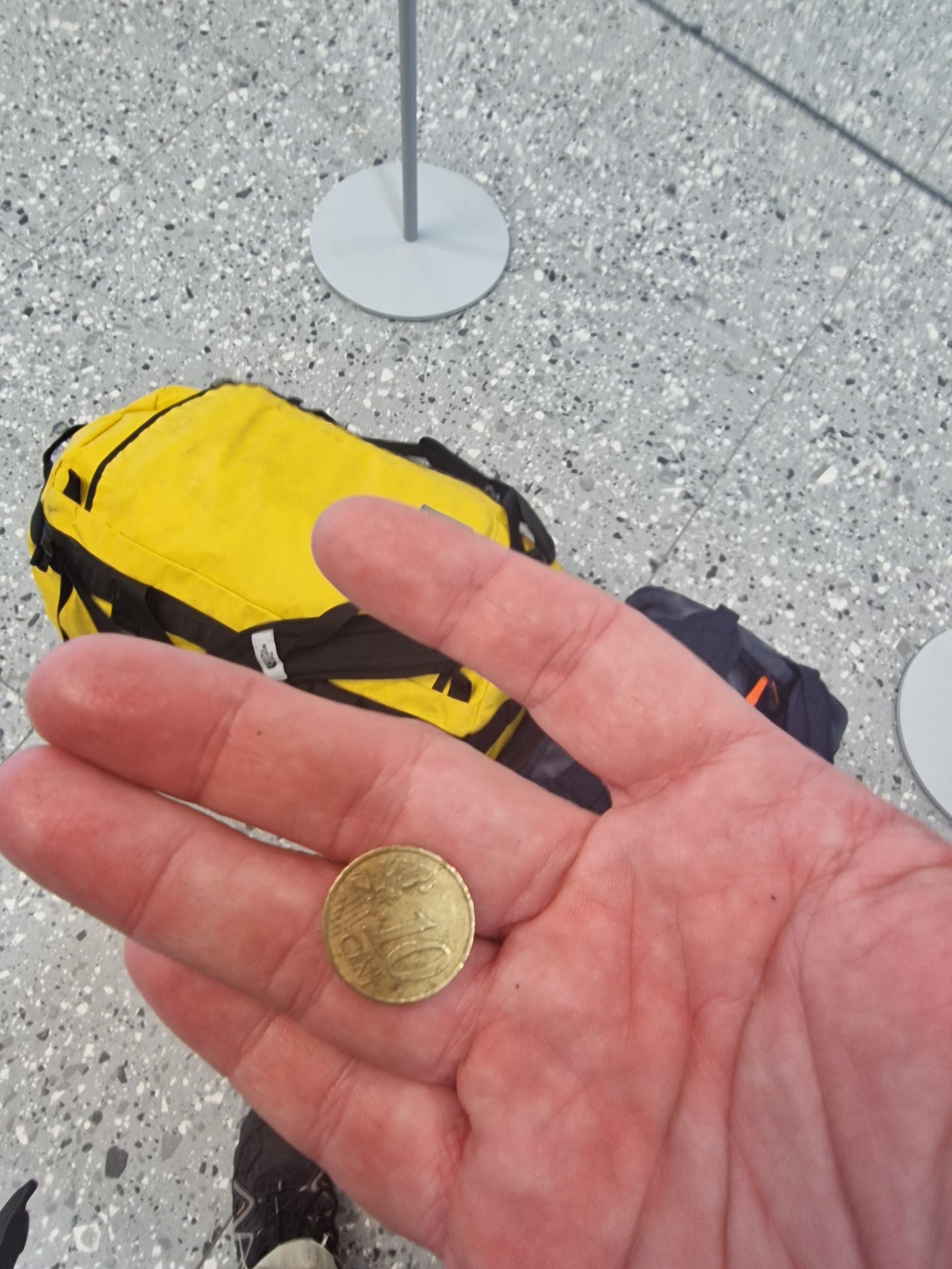
I stood holding my coin, and pondered how ancient a tradition that must be to remain so powerful. And how many lives have been prematurely ended by silly misunderstandings around the etiquette of how a blade is passed from one person to another.
After being herded around, brought into and out of buildings and buses, by unimpressed looking skinny women smoking yet more cigarettes, we finally made it to the French Police. Before going through the body scanner I said to the young policeman ‘I have metal toecaps in my safety boots’, pointing to my shoes with a clearly inquisitive tone and expression.
‘Wow. Good for you!’ came his sarcastic reply.
UK Border Force questioned people for what seemed lie ages. Including one man with a particularly nervous look about him, who had no return ticket, no cash, and no discernible reason to visit the UK, and another who (I believe from the tone of questioning) had spent a very long time in outside of Europe. Of course, they let us all through. As we all know, immigration control in the UK is simply a pretence of competent governance. There for effect, rather than to be effective.
The crew of the P&O ferry reminded me of my time on cruise ships. All of the stewards and hotel staff were Filipino or Indian. All the of the deck crew and the young officer assigned to passenger control spoke some Slavic Eastern European dialect. Possibly Russian, I don’t know.
I am actually friends with a skipper on one of those ferries from Dover to Calais, but the crew on the ferry were so unpleasant I didn’t even attempt small talk. A sad fate for the Packet & Orient.
As an islander, I know the psychological and symbolic role that the ferry plays. The ferry itself becomes to border between two places. It is the liminal space where cultures mix and accents attune foreign tongues to native ears.
It is a very strange thing to have a ferry between England and France, but for there to be no French or English crew to meet you.
The boundary is also a container for the moment when worlds collide. A filter and a crucible for culture. The new P&O, with Cypriot flag and foreign crews, alienates both the French, and the English, whom the line is supposed to serve.
They didn’t even have fish and chips on, and there was no white wine at the bar!
I bought a couple of Gins in a tin and listened to an episode of Lord of Spirits & a James Delingpod about Environmentalist tyranny and Bill Gates being a bit of a rascal.
My taxi driver to Dover station looked Arabic, but had a little wooden crucifix hanging from the mirror in his taxi. I think he said he was Egyptian, but grew up in India and went to a Jesuit school. A giant big black guy with a hearty laugh and a very Southern ‘Cockney Geezer’ kind of accent helped me up to the platform with my two bags that were clearly weighing heavily on me after a long day of travel. Perhaps it was the second Gin in a Tin, but the train information was total gobbledygook. If it hadn’t been for some young lad speaking to the train conductor in front of me, I wouldn’t have gotten on the right train.
I sat down beside the teenage boy and thanked him for saving me from error at this late hour in the day.
We got to talking. He was seventeen and finishing his A-levels. He said his dad said he should apply to Oxford because they lived nearby, and it was worth a shot with his grades. He asked my opinion.
I said I hate to break it to you, but as a straight white male, even if you do get in, you’re in for a hell of a time at Uni these days. ‘What’s your motivation for going’, I asked.
‘Money’, was basically his answer.
I explained to him that there are easier ways to make money. He seemed quite fascinated when I mentioned how I knew people at sea who were semi-literate but were paid more than many small business owners for just working a trade offshore. I explained how it’s one of the last places where you can forego all basic employment rights, and work for less than minimum wage to get you started, and how that’s actually a good thing. You can get paid a salary to go to college, and legally avoid income tax for most of your life if you do it right. Some of those semi-literate guys could even be cash millionaires within 15 years if their teachers had taught them anything about finance, or if they didn’t spend every penny on big-engine cars, tattoos, drugs, booze and holidays.
I gave him a few websites to look up, but I’m afraid his true ambition was to be a YouTube star. Still, the poor boy did manage to walk me to my hotel in Canterbury.
And what a place Canterbury is!
I didn’t give much thought to Canterbury as a destination. I simply wanted to buy a van from a little independent dealer there because vans with an automatic transmission are exceedingly rare and cost more than twice as much in Scotland. Particularly since shopping was forced online during the last three years by governments who claim to ‘support the high street’.
I arrived late and had to collect the van at 9 am to be on my way quickly for the 11-hour drive back to Jockland. So, as is often the case, I had to do my sightseeing at night, and between the hours of six and nine am, before anything was open to the public.
Of course, I wandered the streets, which are just breath-takingly beautiful, in the most English of ways. But my friend Harry advised me that Saint Martin’s Church was a must-see, so at first light that was my first stop.
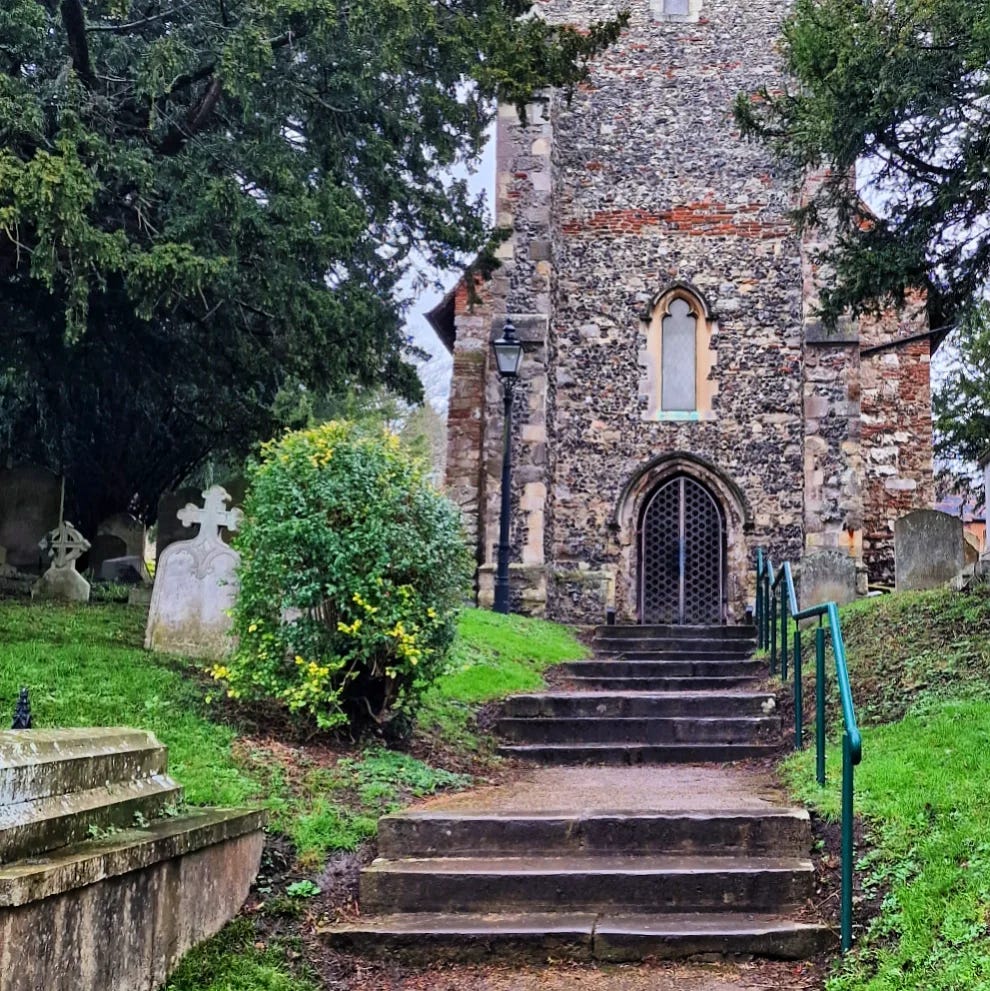
St Martin’s is the oldest church continuously in use in the English speaking world. It was built before England even existed and remains in use today.
The annoyingly modernist archaeological notes on the church sign state that they know the church was ‘first built before the year 410 AD’. The kind of guarded statement that specifically designed to remove all romance and meaning from our history. They can say that because a section of the building is Roman, but that is about as far as modernist autists will go. Wikipedia further echoes this dry sentiment.
Luckily, I know from listening to the world of podcasts that there is a bit more meaning to the story.
The church is dedicated to Martin of Tours, from Tours in France. That is the place in medieval literature where female fugitives from the fall of Troy were said to have come from, on their way to settle here. Not finding any native males, they mated with evil spirits and bred a race of Enochian giants. Albion, the name of Britain, was the name of the ruler of this race of Giants. This is also why London was originally called New Troy (according to some). Interestingly, Romans also claimed the same ancestry. The Trojan exile Brutus, who came to Albion and took over from the Giants of old, shared an ancestor with all Roman emperors. Brutus, interestingly, also founded the city of Tours, where both Queen Bertha and Saint Martin were later to come from.
Ten years after Jesus was crucified by the Romans, the empire invaded the British Isles. But the line of British rulers who were descended from Trojans were seen as legitimate parts of the story when they interacted with Rome. One of the first marriages between a British King and a Roman Princess was said to have been the beginning of the lineage that lead to the birth of Constantine the Great.
By the year 200 AD, there were Celtic Christians present in Ireland and in the North, but mostly Pagans in modern England.
Legendary accounts of the church state that it was in use as a church long before Princess Bertha came from Tours in France to marry Ethelbert, King of Kent, and convert the Anglo-Saxon monarch and his people to Christianity. A story discounted by modern scholars without a discernible reason being offered. However, if we consider that Christianity was still illegal in the Roman empire until the year 380 AD, (while Saint Martin was possibly still a soldier in the Roman Army?) we might forgive the early builders of this magnificent place for not leaving enough visible evidence of their faith to satisfy scholars 1800 years later.
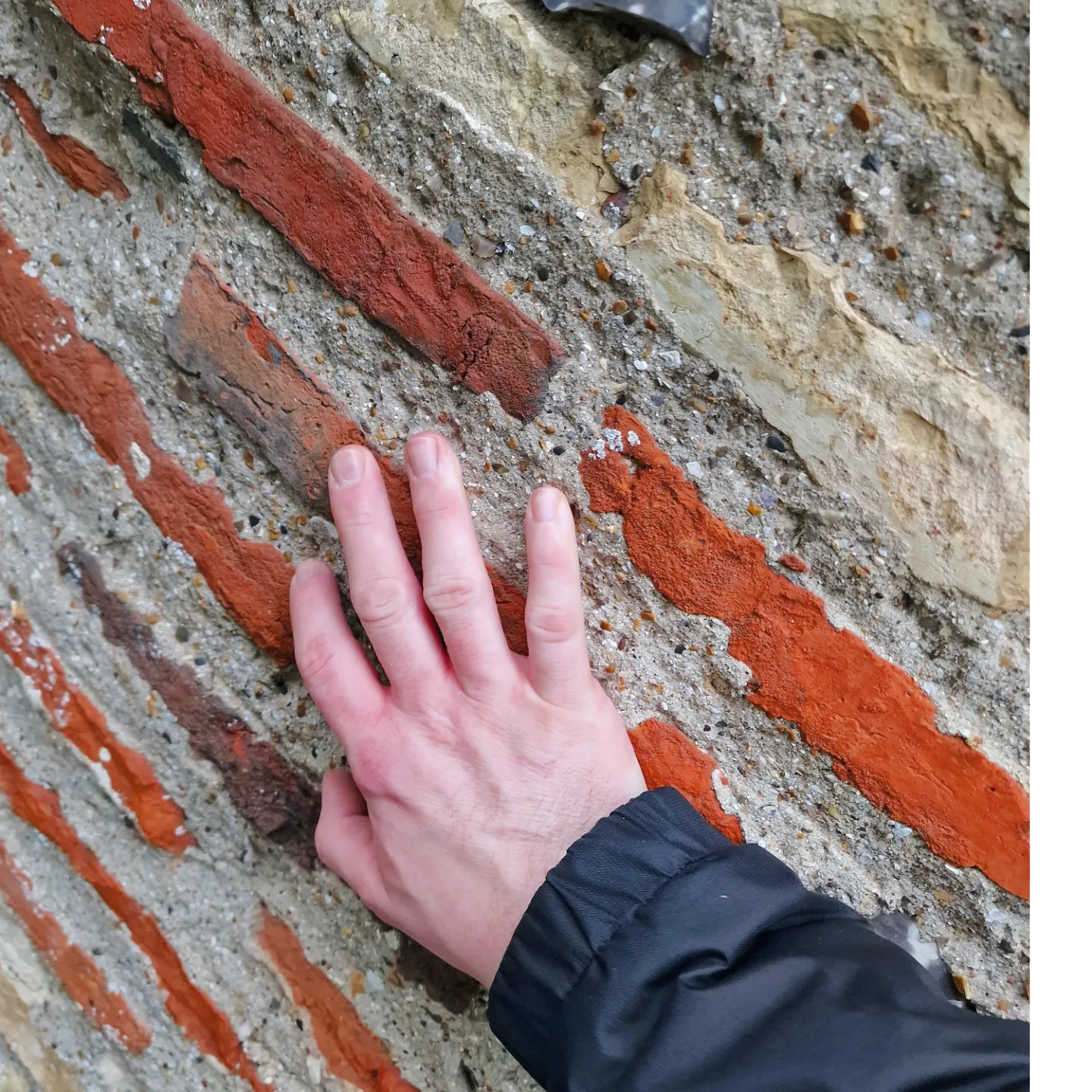
Just imagine what story this place could tell. It’s walls were built by Roman hands, possibly hundreds of years before the ‘British’ Emperor, Constantine the Great, legalised Christianity, untied the fractured Roman Empire, and founded the world’s first Christian city, Constantinople. A city he built only a few miles from the site of the legendary former home of his ancestors, the ancestors of all British monarchs, Troy. A location he is said to have found by following an angel around the modern Turkish countryside, with no modern maps or visible remnants to guide him to that spot.
Think of the practices of Pagan kingship, human sacrifice of children and women, blood feuds, arbitrary justice, the deification of kings, and the Greco-Roman ideas of marriage, violence and slavery for a moment. The cruelty of that world was condemned by a British Roman Emperor.
It was Constantine legitimising the church and ruling well that brought the concept of anointed kingship, and the responsibility of kings to the people and their accountability to God above them, that was the real foundation of our society. It had little or nothing to do with Athens, so much as Deuteronomy. This is why the Anglo-Saxon feudal lords voted for their kings. This is why Britain has never been a mob-rules democracy, to this day.
The inheritors of the modern vassal/failed state of Greece should perhaps contemplate that context a little more deeply when they’re complaining about the Parthenon marbles.
I don’t care if modern Wikipedia editors can’t find enough supporting evidence to prove that Constantine’s low-born mother was British, despite every early medieval text claiming that she was. (No offence to Wiki editors, H J ). Our modernist ticks like that completely miss the point about virtually everything.
The point is, that these origin stories, our middle age legends, are the only thing that ever brought us together.
What have they been replaced with?
Our stories today are equally religious in their feverish veneration, but utterly degenerate. The origin story for Marxists, BLMers, Neo-Feminists, Gaia worshippers and the like is pretty bleak, and ultimately dissolving, rather than uniting. Their priestly classes have no universally translated handbook by which their congregations may judge the self-appointed clergy. These movements have no redemption in their story. Only pagan ritual and power.
The next stop was of course Canterbury Cathedral.
I wasn’t allowed in because there were some services being conducted, but I viewed it externally from various angles and stood in the gated archway, wondering if this is where Archbishop Thomas Beckett had his head sliced in half by a very un-kingly, King Henry II.
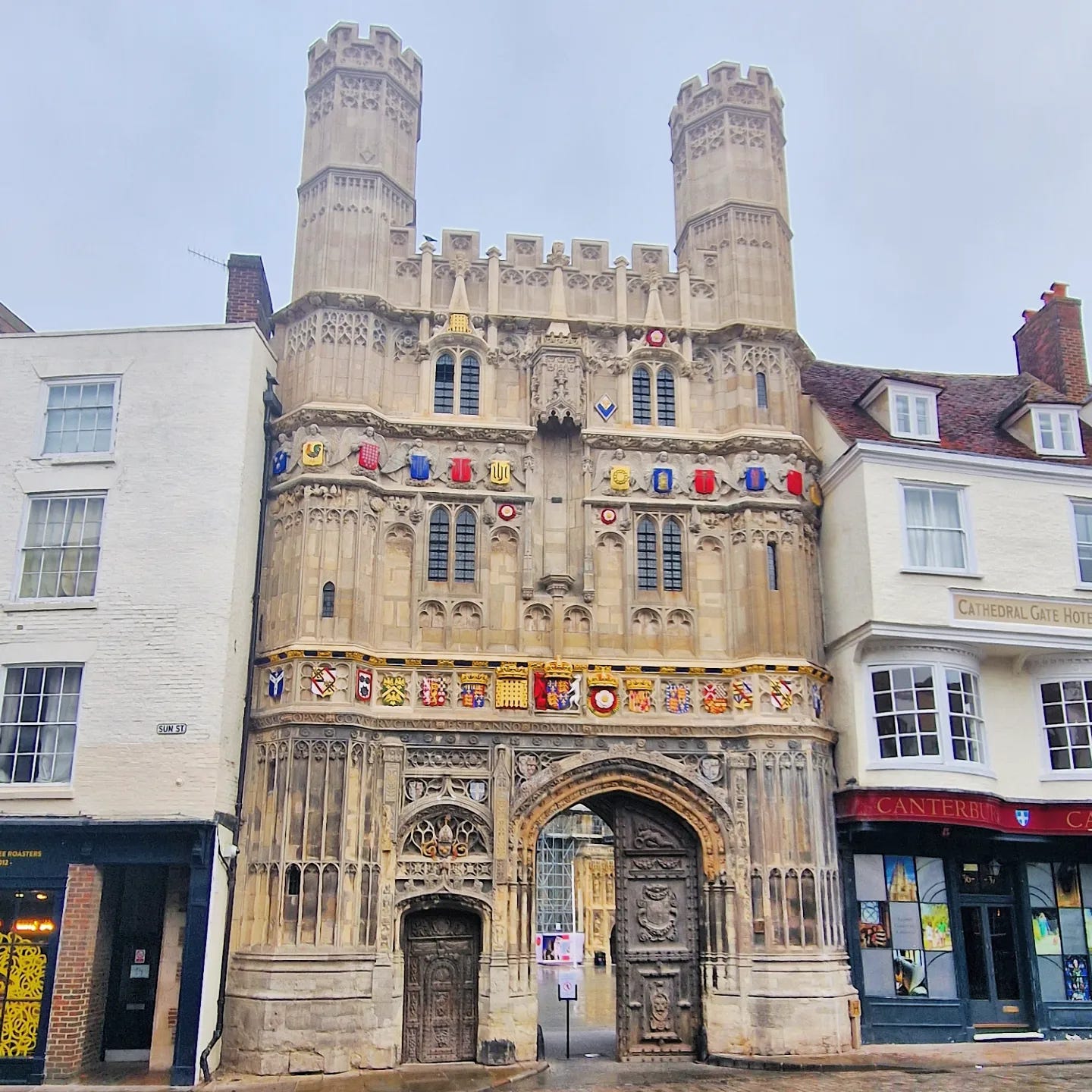
I reflected on the importance of that event. How Thomas Beckett may well have been a bit of rascal himself, but how that didn’t matter. His martyrdom was symbol of shocking tyrannical overreach by a King who failed to abide by God’s laws. How his death become a catalyst for parliamentary democracy, Runnymede, and Magna Carta. How Magna Carta secured the identity of the nation of Scotland, and Wales, and in turn, underpinned the founding philosophy of the United States.
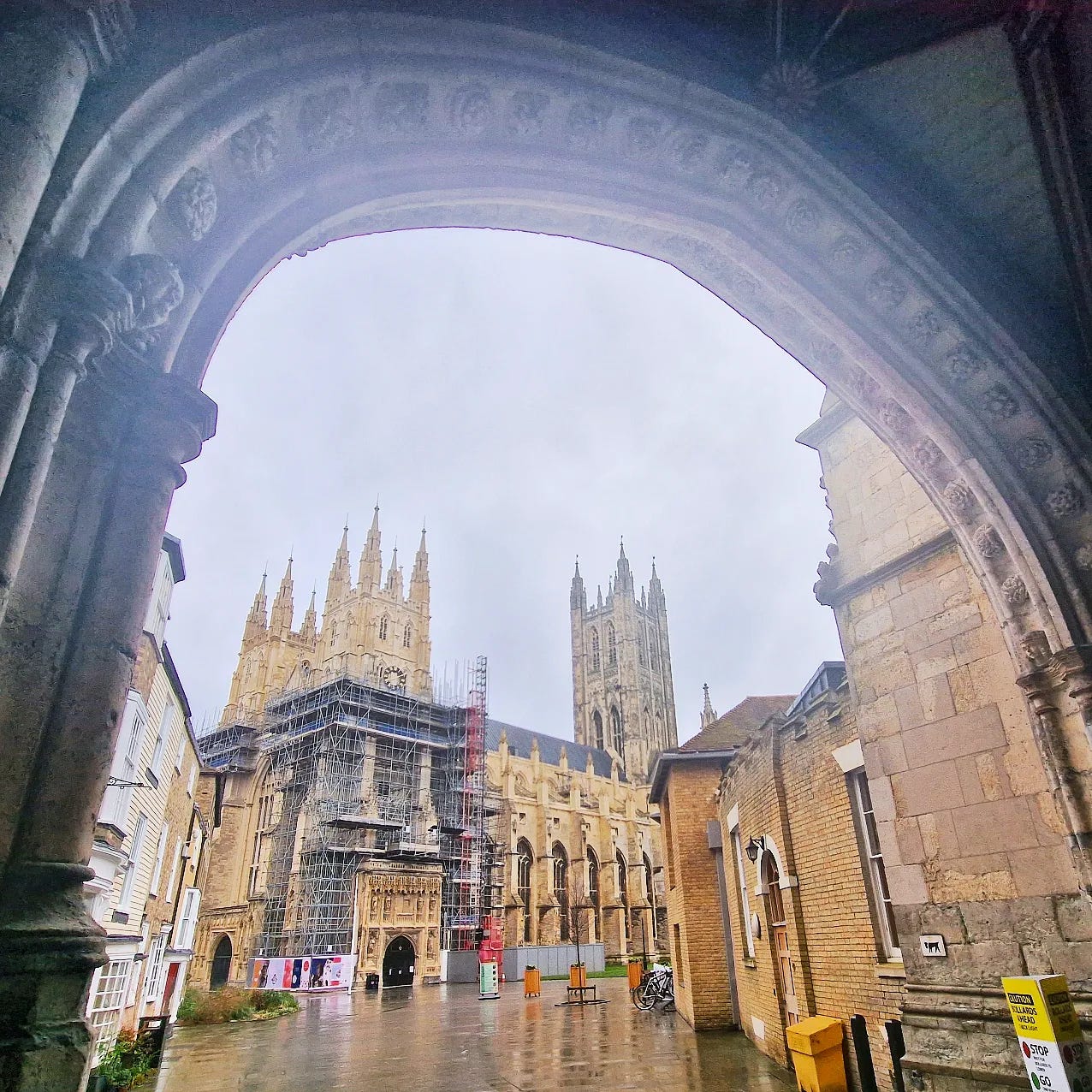
I suddenly understood why Canterbury was selected as a trial location for the 15 minute city program.
Contemplate the supreme irony of enforcing hyper-localised control of human movement and activity in a city that was once a site of holy pilgrimage.
I don’t think it is by accident that the target of the watermelon greenies is a symbolic site of martyrdom, where political power was exposed in a way that brought a tyrant king to humble repentance and humiliation in the street at the hands of mere peasants.
I don’t think it’s a coincidence that Oxford, similarly historically important in reigning in monarchical authoritarianism, is also a target of these utterly evil policies.
Why are they evil?
What right does any person have, whether government employee or not, to take money from hardworking people, and then use it to restrict their freedom of movement?
How can it even be remotely possible that our society can consider such schemes, when we have literally beheaded monarchs for less interference than we now experience on a daily basis?
What Constantine, and the Anglo Saxons knew was that when authority is given to them by God, they had better use it to rule justly and care for their people. Or else they would be judged harshly.
Our bureaucrats and officials have used their authority to elevate themselves above God. They lied about the economy (their God) in 2008, they lied about the continuous wars we’ve had since 2001, they lied about Covid, they lied about the response to Covid, and the jabs, and the environment.
They always lie, and they never repent.
So, they will fall, because they must.
I vowed to come back to Canterbury. And yes, I also vowed to be driving a gas guzzler 500 miles down from Scotland when I do it.
I grabbed a coffee and got a taxi to the van dealer. She was Turkish (Nicely reversing Constantine’s West-to-East migration) and had been living in Canterbury for 12 years. She had never heard of 15-minute cities or LEZs. She was more concerned about her parents who’d survived the recent earthquakes in Turkey by living in their car for the past 10 days. She was a Muslim, who likes to drink and eat bacon. I think England is rubbing off on her.
I love the van. I drove it for 10.5 hrs straight home, with 2 hours in stupid traffic around stupid London. The only slight issue was that when I stopped in the evening to refuel, I was driving on the motorway for about 3 minutes with no lights on before I realised where the switch was. Whoops.
Anyway. I arrived alive.
